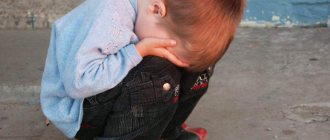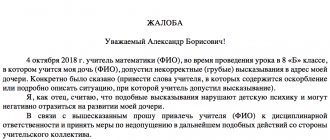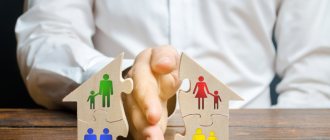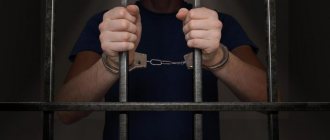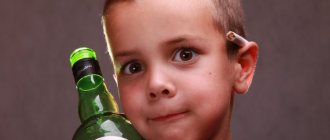According to Art. 1 of the Convention on the Rights of the Child of November 20, 1989, a child is considered a person who has not yet turned 18 years of age. Before reaching adulthood, parents, wherever they are and regardless of whether they are married, must take care of their children, educate them and support them financially. The provisions on parental responsibility for minor children are enshrined in Article 38 of the Constitution of the Russian Federation and directly in Articles 63,64,65 of the Family Code of the Russian Federation.
According to the law, adults can be held accountable for failure to fulfill parental responsibilities. Which one exactly – we’ll look at it in this publication.
Parents are the legal representatives of their child
This means that mom and dad represent the interests of their children in various government institutions - schools, kindergartens, clinics, etc., as well as during the investigation of cases and during legal proceedings.
In almost all social organizations, at least one of the parents is always asked for written consent to any actions regarding a minor. For example, such consent is necessary when a kindergarten plans to give a child an age-related vaccination or if a school student is sent to a competition in another city. Parents, by signing consent or refusing to sign, thereby express their will for the child. This usually happens before he turns 18 years old - as a general rule, it is from this age that full legal capacity begins. The exception is cases when a teenager already has an independent income from the age of 16 (emancipation) or got married before reaching adulthood - in such situations he is equated to an adult and becomes fully capable.
The following rights are equivalent to parental rights:
- guardians, trustees;
- adoptive parents;
- representatives of children's institutions where the child is kept without care (for example, due to the death of both parents).
In accordance with family law, parents and persons equivalent to them bear the following responsibilities in relation to their children:
- moral education;
- participation in physical development;
- creating the necessary conditions for living and subsistence - providing clothing, food, etc.;
- organization of the educational process and leisure;
- representation of interests as necessary in social and medical institutions, investigative, judicial and other bodies.
Turning to various legal areas, it can be seen that children can bear independent responsibility even before reaching adulthood . For example, according to administrative law, responsibility begins at the age of 16; under criminal law, in certain cases, you can become an accused at the age of 14. It turns out that children are still responsible for their behavior independently even before the age of 18? Yes, this is true, but at the same time the parents represent the interests of the child.
For example, when a 15-year-old child is accused of committing murder, a parent must come with him to all investigative actions, participate in interrogations (read about the features of interrogating minors), in confrontations and subsequently in a court hearing, thereby representing the interests of the teenager. This means that mom or dad, as adults and more experienced people, will be able to quickly navigate in the event of a violation of their son’s rights and react in a timely manner (submit a petition, make comments in the protocol, object to some investigative action due to illness, etc.) .
Question: What if a child committed an offense or caused harm to someone before the age of 14 or 16, is the parent responsible for him?
Here it is necessary to distinguish between types of responsibility. Father and mother almost always bear civil liability for damage to a minor, but there are exceptions.
They do not bear criminal or administrative liability for the actions of the child under any circumstances. At the same time, the parents themselves may be brought to criminal or administrative liability for improper upbringing, which was the reason for the teenager to commit a crime or offense.
Let's talk about the types of parental responsibilities in more detail.
Normative base
The responsibilities of parents towards children and the responsibility imposed for their actions are regulated by the following documents:
- International Convention on the Rights of the Child ();
- Family Code ();
- Civil Code ();
- Code of Administrative Offenses ( );
- Criminal Code (–).
Measure of parental responsibility
Domestic legislation rightfully classifies children as the most vulnerable categories of citizens, therefore their rights and interests must be protected as a priority.
By forcing parents to properly raise their children, the state pursues several goals: to raise worthy citizens, to protect society from illegal acts of minors, to punish adults who have not fulfilled their responsibilities towards their offspring. Parents living separately from minors are also held accountable, since this fact does not relieve them of the responsibility to properly raise their child.
Parental rights end when the teenager reaches 18 years of age or earlier upon actual acceleration. At the same time, the citizen’s parental responsibilities towards his son or daughter are terminated.
Civil liability of parents for children
It is customary to differentiate liability for harm caused by minors depending on their age:
- from 14 to 18 years old;
- young age up to 14 years.
Children 14-18 years old
In accordance with the provisions of Article 1074 of the Civil Code of the Russian Federation, adolescents from 14 to 18 years of age are independently responsible for their actions that cause harm to others . And only if they are financially unable to do this, then the parents are partially or fully involved in the obligation of material compensation (this form of responsibility is called “subsidiary”).
This rule does not mean that automatically in every case when a teenager after 14 years of age does not have enough property, mom and dad pay for it. The court, when collecting the missing amount from the parents, is obliged to motivate its decision.
And only if it is established that there are deficiencies in upbringing that led to misconduct and harm, the judge can foreclose on the property and finances of the legal representatives. As a general rule, such representatives usually include guardians, adoptive parents, foster parents, as well as representatives of organizations intended for the residence of orphans.
The following persons are not responsible for children: their grandparents, aunts, uncles, even if the harm was caused while the child was walking with them, visiting them, etc. These are persons who do not have parenting responsibilities (unless, of course, a guardianship agreement has been drawn up), and transferring children into their hands for a time does not relieve mom and dad from responsibility.
As follows from part 2 of Art. 1074 of the Civil Code of the Russian Federation, if the parents prove that the harm was caused by the child through no fault of theirs, responsibility is not assigned to them.
Example No. 1 . 15-year-old Petrov A.R. On June 20, 2019, he broke an expensive display case at the school where he studied. The educational institution filed a lawsuit against its legal representatives. In the first instance, a decision was made to satisfy the claim in full and to recover the amount of damage of 340,000 rubles from the guardians. In the second instance, the decision was overturned and the claim was denied, since the panel of judges found it proven that the adults were not at fault: guardianship was formalized in May 2019, before which the boy was raised in an orphanage. This circumstance, from the point of view of the court, was important, since during the short period of stay in the family, the guardians could not exert the necessary influence and correct the behavior of the difficult teenager - therefore, they were not to blame for what happened.
Meanwhile, court decisions similar to the example are quite a rare case, because the guilt of the parents is assumed from the very beginning and by default it is always there. It is quite difficult to prove its absence and the impossibility of influencing a teenager who is being brought up in a family.
Example No. 2 . A 15-year-old teenager, while intoxicated, damaged his neighbors' expensive car parked in the yard. At the trial, the mother tried to prove that she was not guilty of shortcomings in her upbringing. She said that she never allowed her child to drink alcohol, she strictly monitored it, she did not know how and where he got the vodka. The court did not take into account her arguments, since, as stated in the decision, the mother did not carry out sufficiently effective preventive work to prevent the teenager’s alcoholism. In addition, as it turned out, he committed the offense at night, when the free presence of children on the streets of the city without supervision is unacceptable and the parent was considered responsible for this. The court ordered her to pay for the damage caused to her neighbor by her son.
The obligation to compensate for damages for a child applies strictly to the period when he is still a minor. That is, with the onset of 18 years of age (or emancipation), the parental obligation to pay for damages collected by the court ceases. For example, if financial damages were recovered from his mother for the actions of a 17-year-old teenager, then she has the right not to fulfill the obligation to pay when he comes of age. This rule is especially important when paying in installments.
In judicial practice, there are examples of decisions when the perpetrators of the damage are almost 18 years old and for this reason the court refused to recover from their parents.
Example No. 3 . Ratmirov A.P. and Maslov K.A. On April 1, 2019, they were convicted of committing a property crime; the victim’s claim against their parents was satisfied in full. The higher court canceled the case in terms of resolving the claims and indicated that in May 2022 both convicts were already 18 years old. In this regard, according to the judicial panel, it is inappropriate to impose property liability on adults due to the short period of time before reaching adulthood. The Supreme Court considered it appropriate to impose the obligation of payment on almost adults.
Thus, as a general rule, the obligation to fully compensate for the harm caused by a teenager aged 14-18 lies with that teenager. And only if he does not have enough financial capacity for this, if there is evidence of improper upbringing, the damage must be recovered from the parents, guardians, and social specialized institutions in which the child permanently resides.
Children 0-14 years old
As for (adoptive parents, guardians) are always responsible for the harm they cause
In addition, within the meaning of Art. 1073 of the Civil Code of the Russian Federation, if the damage was caused while the child was being looked after in an educational or medical organization (for example, in a kindergarten, children's hospital), then these institutions are responsible for it (note: in relation to children 14-18 years old there is no such obligation). Supervision can also be organized under a contract - for example, under an agreement on the provision of paid services with a nanny. In such cases, responsibility rests with the person providing the services.
This rule of law makes exceptions: parents, representatives of institutions, etc. are not responsible for the child’s actions if they prove that the harmful consequences did not occur through their fault.
Here again it is necessary to recall that the so-called presumption of guilt of adults applies - they are, in any case, to blame for the mischief their children caused, while the guilt manifests itself both in an insufficiently attentive attitude towards the child, self-removal from education, a clearly negative example, and in excessively harsh methods of influence, with excessive severity or even cruelty. It is difficult to prove the absence of shortcomings in upbringing and, accordingly, the guilt of adults. Such cases are rare in judicial practice.
For example, you can try to prove that you are not at fault in supervising a child when the parent’s place of residence is another city or country. Although even if the father and mother live separately, responsibility is not removed from both of them, under certain circumstances the court may take into account the actually lost connection with the minor due to objective circumstances. For example, when the father has a long business trip abroad, a long illness with a stay in the hospital, etc. It is important that under these circumstances the parent does not shy away from upbringing, and, according to objective data, cannot participate in the life of his son or daughter.
Another nuance in the responsibility of adults: they are responsible not only for material damage caused by children, but also for moral damage, too , but if the actions of the minor were unlawful. In other words, if the child was forced to legitimately defend himself, there can be no talk of any compensation for him.
Example No. 4 . Preschoolers were playing on the playground, 7-year-old Voronin A.P. tried to hit 6-year-old V.V. Maryin on the head with a spatula. In response, Maryin V.V. put his hands up in defense, as a result Voronin fell awkwardly onto the curb and broke a rib. Voronin's parents filed a lawsuit to recover money spent on treatment of the fracture and subsequent rehabilitation, but their demands were completely denied. The court reasonably motivated its decision by the fact that the boy Maryin was forced to put up a defense, due to his age, whatever he was capable of. Under such circumstances, damage to the health of Voronin, who was injured almost through his own fault, is not subject to recovery from Maryin’s parents.
Since young children are considered incompetent (that is, innocent in any case in relation to their actions), after reaching adulthood, parents continue payments, even if their child already has income.
Example No. 5 . For causing the death of a person by 13-year-old Novikov, his parents monthly repaid the amount collected from them in favor of the relatives of the deceased. When Novikov turned 18 years old, his parents continued making payments until the amount collected was fully repaid. This rule applies for the reason that the harm was caused by an incompetent subject - a minor who, due to his age, could not fully understand the meaning of his actions and be responsible for them independently.
Only in exceptional cases, when a child has reached the age of majority and has become financially independent, and his parents, recognized by the court as defendants in a court decision, have died or are unable to continue paying, the court has the right to impose the obligation to compensate for damages on the offender who has become an adult.
To sum up the civil liability of adults for their own children, let us recall that a claim from a child who has suffered from the actions must be:
- addressed to the child himself, if he is over 14 years old;
- addressed to his representatives if he is under 14 years of age.
Parents do not have the right of recourse, that is, the return of funds paid from the child. For example, if a father paid for his son the amount of damage once caused, he will not be able to recover the amount paid from his son who has become an adult, no matter at what age he committed the offense - before 14 or from 14 to 18 years.
Question: Can a court recover damage caused by a child from a father and mother who have been deprived of parental rights?
Yes, if three years have not yet passed since the deprivation of such rights. If both dad and mom are defendants, they will pay the amount jointly and severally.
Civil responsibility
The extent of parents' property liability for any harm caused by the child's actions to third parties depends on the nature of the offense and the age of the child.
Damage caused to minors under 14 years of age is compensated by parents in full. This applies, for example, to damage to goods in a store, a broken window at a neighbor’s house, etc. Teenagers 14-18 years old compensate for property damage on their own, since they are already partially capable. If the amount of damage caused is large or the child does not have income to cover it (which happens most often), the parent (guardian) will also have to compensate for the damage or loss of property.
Citizens deprived of parental rights may also be involved in compensation for damage caused by their offspring. In this case, no more than 3 years must pass from the moment of deprivation of rights.
Administrative responsibility of parents for offenses committed by their children
In accordance with administrative legislation, a person guilty of committing an administrative offense is sentenced under the sanction of an article of the Code of Administrative Offenses of the Russian Federation. As already noted, responsibility for offenses begins at the age of 16 . It is from this age that teenagers can be charged for violating public order, for smoking in the wrong place, and even for violating traffic rules (for example, crossing the road not at a zebra crossing). In most cases, the culprit will be punished with a fine.
Question: What if a teenager has no money and cannot pay it within 60 days, as required by law?
In such situations, paying the fine is the responsibility of the parents.
So, in accordance with paragraph 2 of Art. 32.2 of the Code of Administrative Offenses of the Russian Federation, in the absence of funds from a minor, the amount of the fine is collected from his legal representatives. At the same time, it is important to understand that they do not become administratively liable ; the direct offender, that is, the teenager, will be considered guilty and punished. Parents only help to fulfill the punishment assigned to him.
This rule follows from the general concept of parental responsibility for raising their own children, since it is believed that their lack of attention and care to a certain extent caused the child to commit an offense.
At the same time, in contrast to civil law, it does not matter whether the guilt of deficiencies in upbringing is proven or not - the legal representatives in any case pay the fine if their child does not have the financial capacity.
In accordance with part 3 of Art. 14.1 of the 1998 Law “On Basic Guarantees of the Rights of the Child in the Russian Federation”, at the local level in each region there is an administrative law according to which parents are responsible for keeping their children in unsafe places without adult supervision. For example, in accordance with Art. 3.12 of the Code of Administrative Offenses of Moscow, it is an offense to fail to take measures to prevent a teenager under 16 years old from being on the roofs of houses, in basements, near reservoirs, in parks, etc. at night (from 11 p.m. to 6 a.m.). The amount of the fine issued to legal representatives can range from 100 to 500 rubles. Especially often, according to this article, adults are attracted precisely in the summer, when children have more time for walks, taking into account long holidays.
There are several more norms of administrative law that regulate the responsibility of parents for not fully caring for their children, not ensuring their moral and physical development, not paying attention to improving their educational level and not worrying about their safety:
1. part 1 tbsp. 5.35 of the Code of Administrative Offenses of the Russian Federation, according to which guardianship authorities or the police have the right to draw up reports on violations of Art. 63 of the RF IC, which talks about the obligation of any parent to take care of the health, education, and physical development of a minor. Responsibility is assumed both for a complete lack of participation in the child’s life, and for improper performance of one’s duties.
The Code of Administrative Offenses of the Russian Federation does not stipulate what exactly such offenses are. At the same time, improper upbringing of children, based on other federal laws (on education, on the basics of preventing neglect, etc.), is:
- lack of control over the educational process (for example, a daughter does not attend school and parents take this calmly, not persuading her to continue her education);
- failure to take measures for treatment and recovery (the child is registered with a doctor with a serious illness, but the mother does not come for examinations and treatment);
- failure to provide the child with the basic necessities: food, shoes, clothing, failure to fulfill maintenance obligations in general (benefits or alimony are spent for other purposes);
- creating conditions that adversely affect moral development - organizing brothels, swearing, conflicts, constant drinking of alcohol, etc.
In addition, in almost all cases when an offense is committed by a person who is not yet 16 years old and cannot be prosecuted, responsibility for his actions rests with the parents under Part 1 of Art. 5.35 Code of Administrative Offenses of the Russian Federation. For example, for violating traffic rules – Part 1 of Art. 12.7 of the Code of Administrative Offenses of the Russian Federation - a 14-year-old teenager cannot be charged with driving a car due to under 16 years of age. At the same time, the parents are to blame for not limiting the child’s access to a source of increased danger, which means they will be charged under Part 1 of Art. 5.35 Code of Administrative Offenses of the Russian Federation for improper education.
Punishment under this article can be in the form of a fine from 100 rubles to 500 rubles. In addition, the family will be placed on preventive care and will be constantly monitored.
2. art. 20.22 of the Code of Administrative Offenses of the Russian Federation - this norm allows you to attract legal representatives for the fact that their son or daughter, who is under 16 years of age, is in a state of alcohol or drug intoxication.
In order to attract parents, it is necessary to establish the fact that the teenager is intoxicated or record the fact of his consumption of alcoholic beverages, psychoactive or intoxicating substances. Punishment for adults can be a fine of 1,500 to 2,000 rubles.
3. part 2 tbsp. 6.10 Code of Administrative Offenses of the Russian Federation - according to which parents are held responsible for involving children in drinking alcohol or using drugs. Such actions may be punishable by a fine of 4,000 to 5,000 rubles.
4. art. 5.35.1 Code of Administrative Offenses of the Russian Federation - which specifies the responsibility of parents who are obliged by court or by notarial agreement to pay alimony in favor of a minor. Failure to fulfill this obligation may result in mandatory labor or even administrative arrest.
5. part 2 tbsp. 6.23 of the Code of Administrative Offenses of the Russian Federation - on the basis of which legal representatives who involve children in the process of smoking tobacco products are punishable by a fine of 2,000 to 3,000 rubles.
Typically, protocols are drawn up by police officers from the juvenile affairs department and are considered at meetings of commissions on the rights of minors and the protection of their rights. The decision made by the commission is an act of bringing to administrative responsibility; it can be appealed in court.
Criminal liability
In the Russian Federation, citizens over 16 years of age are subject to criminal liability. If a particularly serious crime has been committed - from the age of 14. In particular, from the age of 14, a teenager is independently responsible for the following acts:
- intentional infliction of harm to health;
- murder, kidnapping, rape and other acts of a similar nature;
- robbery;
- theft, robbery;
- vandalism;
- vehicle theft;
- terrorism, deliberately false reporting of terrorist attacks;
- malicious hooliganism;
- attempted extortion;
- intentional destruction and damage to property of third parties;
- hostage taking;
- storage, carrying, use of weapons, ammunition, explosives;
- trade in narcotic and psychotropic substances;
- damage to transport and communications.
If a child under 14 years of age is caught in such actions, the parents will bear responsibility for him and will be given a punishment in the manner prescribed by the norms of the Criminal Code of the Russian Federation.
How are parents punished for failure to fulfill their duties?
Various authorized authorities can encourage negligent adults to fulfill their duty in relation to children (guardians).
The priority here belongs to the guardianship and trusteeship authorities. It is this structure that must be contacted when identifying facts of violation of the rights of a child, inadequate care for him or her, or complete neglect of the interests of a minor. A case against would-be parents who cause harm to a child is opened by social services together with law enforcement agencies. When facts of cruel treatment of a minor are revealed, the court is responsible for clarifying all the circumstances and choosing a measure of influence on the parents.
To punish a citizen for failure to fulfill parental responsibilities, law enforcement agencies draw up a protocol on an administrative offense and submit it to the commission for minors. The latter will study all the circumstances of the case and make a decision taking into account the severity of the parent’s offense. Negligent fathers and mothers may be punished with a fine or community service.
In relation to particularly malicious violators, a process for deprivation of parental rights is opened. If previously such a measure of punishment was used quite rarely, today courts are increasingly taking away children from negligent mothers and fathers. Then the minors are placed in orphanages or handed over to guardians (adoptive parents) who can properly take care of their upbringing.
Read: Child support from parents deprived of parental rights
Prevention of illegal actions of children
The words that a child’s inappropriate behavior is a natural consequence of improper upbringing have long become commonplace. However, some fathers and mothers forget to regularly remind their child of the need to comply with moral and ethical standards and constantly monitor their behavior. For example, the concept of private property instilled in a child in time will protect him from committing thefts and other crimes of a property nature.
With teenagers, starting from 12-13 years old, it is necessary to have conversations about the consequences of the onset of legal capacity and the obligation to be responsible for their actions.
For example, not all young people understand that they personally will have to compensate for the damage caused. In addition, teenagers should know that committing crimes in a group is an aggravating circumstance. This will prevent them from participating in antisocial acts “for company.”
